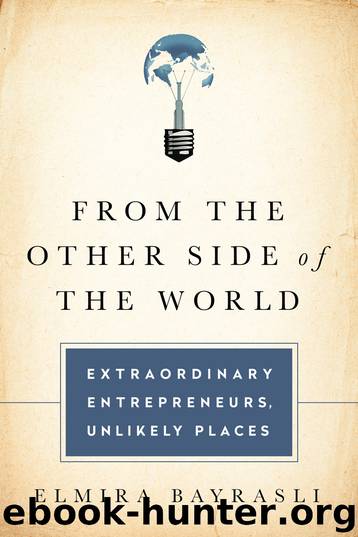1610393031 (N) by Elmira Bayrasli

Author:Elmira Bayrasli [Bayrasli, Elmira]
Language: eng
Format: epub
ISBN: 9781610393041
Publisher: PublicAffairs
Published: 0101-01-01T00:00:00+00:00
FIVE
“A Little Bit of Extra . . .”: Ending Corruption
Always do right. This will gratify some people and astonish the rest.
—MARK TWAIN
Mumbai and New Delhi
In the dimly lit entry hall of Mumbai’s state-owned telecommunications company, the smell of mold oozes from floors and walls. Middle-aged bureaucrats, babus, dressed in collared shirts, hide their potbellies behind desks covered with rubber stamps and piles of paper, some slightly yellowing. On one morning in early 2005 when Shaffi Mather arrived at the office, he felt he had passed through a time warp. He resisted an urge to turn and walk out.
Improving this—India’s public service mess—was the dream that had brought Shaffi to the shabby offices of Mahanagar Telephone Nigam Limited (MTNL). A gangly lawyer with wire-rimmed glasses, a receding hairline, and a slight overbite, Shaffi carried with him a plan for an ambulance service. It would be, he believed, a startup that could save lives while helping to modernize health care and perhaps India, too.
Focused on his mission, Shaffi squeezed past a crowd in the entry hall. All he needed, he reminded himself, was something the bureaucrats in the ministry gave out every day: a phone number. Shaffi approached what seemed to be a reception desk. With difficulty he managed to attract the attention of the man sitting behind it.
“I’m starting an ambulance company and want to register for an easy-to-remember phone number that sick or injured people could call in emergencies,” he said.
Every day in some corner of sprawling Mumbai, there is an accident or emergency—a man falls off a roof, a child is hit by a car, a woman doubles over in pain, or an elderly person has a heart attack. In the West, one can easily call an ambulance for help. Until very recently that was not possible in Mumbai, or in any of India’s cities. In fact, it was not possible to call for an ambulance in any of the country’s twenty-nine states, which have the primary responsibility for caring for India’s 1.2 billion citizens.
Shaffi Mather, along with four friends, intended to fill the gap the government could not. None were activists or had a background in health care or public service. They were lawyers, investors, and marketing executives—well-to-do thirty-somethings. Like most people of their generation, they had embraced a social consciousness. That consciousness, along with a number of personal encounters that magnified the importance of emergency response care, led them to take an interest in their county’s lack of ambulances. An ambulance service, they believed, could not only improve India’s health care; it could mobilize change in India’s public services—transform them to be more accountable, trustworthy, and service-oriented. As he continued to talk and the man, the babu, before him gazed at him coldly, Shaffi sensed that getting that simple phone number to make his dream a reality would be more difficult than he had anticipated.
He was right.
“Where shall I go?” Shaffi asked the bureaucrat after explaining his mission. A fan sputtered overhead. “What should I do?
“Wait your turn,” came the brusque reply.
Download
This site does not store any files on its server. We only index and link to content provided by other sites. Please contact the content providers to delete copyright contents if any and email us, we'll remove relevant links or contents immediately.
The Meaning of the Library by unknow(2573)
Six Billion Shoppers by Porter Erisman(2305)
Why Nations Fail: The Origins of Power, Prosperity, and Poverty by Daron Acemoglu & James Robinson(2299)
No Time to Say Goodbye(2119)
Red Notice by Bill Browder(2082)
Currency Trading For Dummies by Brian Dolan(1929)
The Economist [T6, 22 Thg9 2017] by The Economist(1927)
Thank You for Being Late by Thomas L. Friedman(1772)
Bitcoin: The Ultimate Guide to the World of Bitcoin, Bitcoin Mining, Bitcoin Investing, Blockchain Technology, Cryptocurrency (2nd Edition) by Ikuya Takashima(1699)
Amazon FBA: Amazon FBA Blackbook: Everything You Need To Know to Start Your Amazon Business Empire (Amazon Empire, FBA Mastery) by John Fisher(1576)
Coffee: From Bean to Barista by Robert W. Thurston(1549)
The Future Is Asian by Parag Khanna(1484)
The Great Economists by Linda Yueh(1457)
How Money Got Free: Bitcoin and the Fight for the Future of Finance by Brian Patrick Eha(1425)
Grave New World by Stephen D. King(1422)
Pocket World in Figures 2018 by The Economist(1422)
Capitalism Without Capital: The Rise of the Intangible Economy by Jonathan Haskel(1402)
The Sex Business by Economist(1386)
Cultural Intelligence by David C. Thomas(1290)
